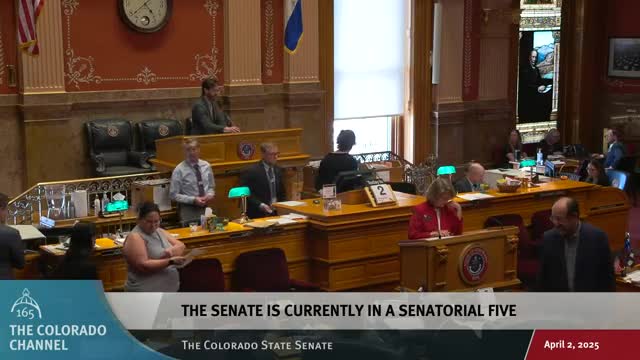Senate passes multiple bills including $4M transfer for infrastructure fund
April 03, 2025 | Senate, Committees, Legislative, Colorado
This article was created by AI summarizing key points discussed. AI makes mistakes, so for full details and context, please refer to the video of the full meeting. Please report any errors so we can fix them. Report an error »

During the Colorado Senate's Legislative Day on April 3, 2025, a series of significant discussions unfolded regarding budget allocations and legislative bills that could impact various state programs and funding mechanisms. The meeting highlighted the ongoing challenges of balancing the state budget while addressing the needs of different sectors, including education, healthcare, and infrastructure.
One of the most contentious topics was the proposed amendment to cut $4 million from the marijuana tax cash fund to support entrepreneurial initiatives. Senator Kirk Meyer raised concerns about the potential impact of these cuts on essential programs, questioning which areas would face reductions. He specifically mentioned the implications for early childhood education, community support programs, and social-emotional learning grants. This discussion underscored the delicate balance lawmakers must strike between fostering economic growth and maintaining funding for critical social services.
In addition to the budget discussions, the Senate adopted several bills, including Senate Bill 269, which involves transferring $4 million from the general fund to the Infrastructure Investment and Jobs Act cash fund. This move aims to bolster infrastructure projects across the state, reflecting a commitment to improving public services and facilities.
Another notable bill, Senate Bill 270, focused on nursing facilities and proposed to shift fees collected by the Colorado Healthcare Affordability and Sustainability Enterprise (CHASE). This bill sparked debate over its alignment with the Taxpayer Bill of Rights (TABOR), with some senators expressing concerns that the changes could circumvent voter-approved financial constraints. Critics argued that the bill could effectively increase taxes without direct voter consent, raising questions about transparency and accountability in government spending.
Senator Amabile defended the bill, emphasizing its potential benefits for Medicaid expansion and healthcare funding, while opponents cautioned against the long-term implications of altering the funding structure for nursing facilities. The discussions highlighted a broader tension within the legislature regarding fiscal responsibility and the need for transparency in government operations.
As the session progressed, several amendments were proposed to enhance accountability measures for the CHASE enterprise, aiming to ensure that the public remains informed about how funds are utilized. However, these amendments faced opposition and were ultimately rejected, indicating a divide among lawmakers on how best to manage public funds.
In conclusion, the Colorado Senate's recent meeting revealed critical discussions surrounding budget allocations and legislative proposals that could significantly impact state programs and taxpayer rights. As lawmakers continue to navigate these complex issues, the outcomes of these debates will shape the future of funding for essential services in Colorado. The next steps will involve further deliberations on these bills as they move through the legislative process, with ongoing scrutiny from both supporters and critics.
One of the most contentious topics was the proposed amendment to cut $4 million from the marijuana tax cash fund to support entrepreneurial initiatives. Senator Kirk Meyer raised concerns about the potential impact of these cuts on essential programs, questioning which areas would face reductions. He specifically mentioned the implications for early childhood education, community support programs, and social-emotional learning grants. This discussion underscored the delicate balance lawmakers must strike between fostering economic growth and maintaining funding for critical social services.
In addition to the budget discussions, the Senate adopted several bills, including Senate Bill 269, which involves transferring $4 million from the general fund to the Infrastructure Investment and Jobs Act cash fund. This move aims to bolster infrastructure projects across the state, reflecting a commitment to improving public services and facilities.
Another notable bill, Senate Bill 270, focused on nursing facilities and proposed to shift fees collected by the Colorado Healthcare Affordability and Sustainability Enterprise (CHASE). This bill sparked debate over its alignment with the Taxpayer Bill of Rights (TABOR), with some senators expressing concerns that the changes could circumvent voter-approved financial constraints. Critics argued that the bill could effectively increase taxes without direct voter consent, raising questions about transparency and accountability in government spending.
Senator Amabile defended the bill, emphasizing its potential benefits for Medicaid expansion and healthcare funding, while opponents cautioned against the long-term implications of altering the funding structure for nursing facilities. The discussions highlighted a broader tension within the legislature regarding fiscal responsibility and the need for transparency in government operations.
As the session progressed, several amendments were proposed to enhance accountability measures for the CHASE enterprise, aiming to ensure that the public remains informed about how funds are utilized. However, these amendments faced opposition and were ultimately rejected, indicating a divide among lawmakers on how best to manage public funds.
In conclusion, the Colorado Senate's recent meeting revealed critical discussions surrounding budget allocations and legislative proposals that could significantly impact state programs and taxpayer rights. As lawmakers continue to navigate these complex issues, the outcomes of these debates will shape the future of funding for essential services in Colorado. The next steps will involve further deliberations on these bills as they move through the legislative process, with ongoing scrutiny from both supporters and critics.
View full meeting
This article is based on a recent meeting—watch the full video and explore the complete transcript for deeper insights into the discussion.
View full meeting
